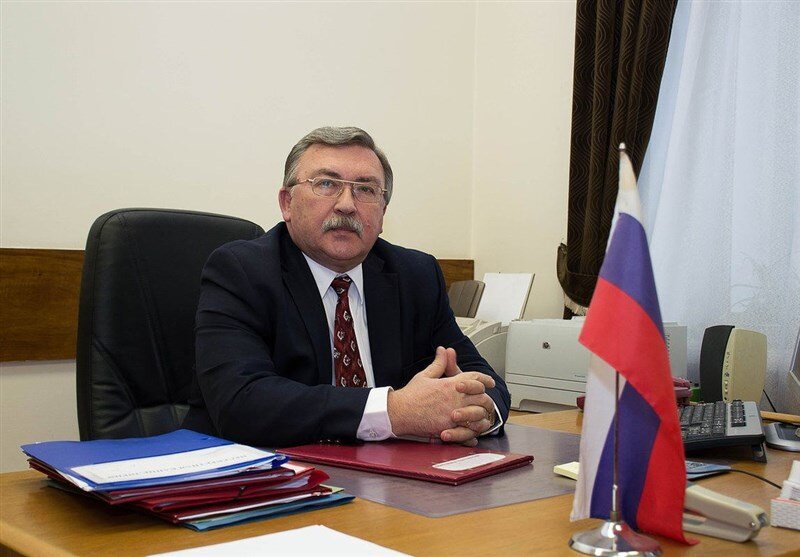U.S. attempts to present itself as JCPOA participant have no future: Russia

TEHRAN - Mikhail Ulyanov, Russia’s permanent representative to the Vienna-based international organizations, has said that the United States’ attempts to present itself as a participant to the 2015 nuclear deal, known as the JCPOA, have no future.
“The US attempts to present itself as ‘JCPOA participant’ have no future. It is like common sense mockery. Those who invented this idea gave a bad advice to US authorities. Cynical approaches must have their own limits in order not to compromise national policy to the worst extent,” he tweeted on Thursday.
In a report on Sunday, The New York Times said Pompeo is preparing a legal argument that the United States remains a participant in the Iran nuclear accord that President Trump has renounced, part of an intricate strategy to pressure the United Nations Security Council to extend an arms embargo on Tehran or see far more stringent sanctions reimposed on the country.
“In an effort to force the issue, Mr. Pompeo has approved a plan, bound to be opposed by many of Washington’s European allies, under which the United States would, in essence, claim it legally remains a ‘participant state’ in the nuclear accord that Mr. Trump has denounced — but only for the purposes of invoking a ‘snapback’ that would restore the UN sanctions on Iran that were in place before the accord,” The Times said.
Trump unilaterally quit the nuclear deal in May 2018 and introduced the harshest ever sanctions in history on Iran as part of his administration’s “maximum pressure” strategy against Iran. By its exit from the nuclear accord, the U.S. flagrantly violated UN Security Council Resolution 2231 that approved the pact.
Former Democratic presidential candidate Elizabeth Warren has dismissed the argument by the Trump administration.
“The international prohibition on weapons going to/from Iran ends in October. To extend this arms embargo, the Trump admin is suddenly arguing that the US is a party to the same Iran Deal it abandoned. That makes no sense. Make up your mind, @SecPompeo,” Warren tweeted.
Tony Blinken, the Joe Biden campaign’s chief foreign policy adviser, has also slammed the Trump administration “sheer hypocrisy” for relying on a mechanism in the JCPOA to reinstate multilateral sanctions on Iran should the United Nations fail to extend an arms embargo on Tehran.
“It’s hard not to almost admire the sheer hypocrisy of the action that the administration is trying to take in seeking to, in effect, force countries at the Security Council to find a way to extend the arms embargo on Iran,” Al-Monitor quoted Blinken as saying on Tuesday on a virtual panel hosted by the Jewish Democratic Council of America.
“They’re trying to use this provision in the [nuclear deal] to require the extension of the arms embargo. The only problem is we are no longer participating in the agreement,” Blinken said.
In a report published by Reuters on Tuesday, it was also said that the United States will face a tough, messy battle if it uses a threat to trigger a return of all UN sanctions on Iran as leverage to get the 15-member Security Council to extend and strengthen an arms embargo on Tehran, diplomats said.
Washington has shared its strategy, confirmed by a U.S. official speaking on condition of anonymity, with Britain, France and Germany, who are council members and parties to the 2015 deal between Iran and world powers.
Under that deal, a UN arms embargo on Iran is due to expire in October. A U.S.-drafted resolution to extend the embargo has been given to Britain, France and Germany, the U.S. official confirmed, but UN diplomats said it has not been shared with the remaining 11 council members, including Russia and China.
“It will be dead on arrival,” predicted a Security Council diplomat, speaking on condition of anonymity.
A resolution needs nine votes in favor and no vetoes by Russia, China, the United States, Britain or France to be adopted. Diplomats said the United States would likely struggle to get Russia and China to allow an arms embargo extension.
Russia and China are also parties to the Iran nuclear deal.
“It’s very difficult to present yourself as a compliance watcher of a resolution you decided to pull out of,” said a European diplomat, speaking on condition of anonymity. “Either you’re in or either you’re out.”
It is a move likely to be challenged, diplomats said.
“It’s going to be messy from a Security Council standpoint because, regardless of what (Britain, Germany and France) think, Russia and China are not going to sign up to that legal interpretation,” said a European official, speaking on condition of anonymity.
NA/PA
Leave a Comment